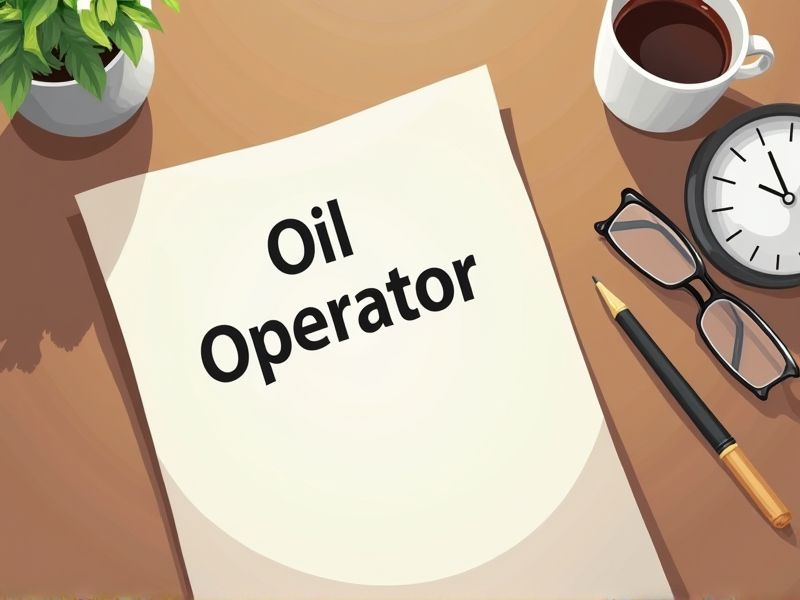
Oil refinery operators manage complex machinery to convert crude oil into usable products, and achieving proficiency in this field is crucial. Certifications validate an operator's ability to adhere to safety protocols and regulatory compliance, reducing risks of hazards and accidents. Specialized qualifications ensure operators possess the necessary technical skills to handle the intricate systems involved in refining processes. Key certifications essential for an oil refinery operator include those related to safety, operations, and environment management.
OSHA 10-Hour General Industry Safety Certification
Oil refineries involve complex machinery and hazardous substances, which increases the risk of accidents, making the OSHA 10-Hour General Industry Safety Certification essential. This certification educates operators on fundamental safety protocols and hazard recognition, minimizing workplace incidents. Refineries must comply with stringent safety regulations; this certification helps ensure adherence, thus avoiding costly legal penalties. Certified operators contribute to creating a safety-oriented culture, reducing potential operational disruptions caused by incidents.
OSHA HAZWOPER Certification
OSHA HAZWOPER Certification is vital for oil refinery operators because it ensures they are trained to handle hazardous substances safely, minimizing risk to themselves and the environment. The certification provides operators with knowledge on emergency response procedures, crucial in preventing accidents and mitigating their impacts. Without proper training, operators might respond inadequately to spills or leaks, leading to severe environmental and health consequences. Compliance with OSHA standards also fulfills legal requirements, avoiding potential fines and enhancing workplace safety culture.
H2S Awareness Training Certification
H2S Awareness Training Certification is crucial for an oil refinery operator due to hydrogen sulfide's highly toxic and potentially lethal nature when inhaled. Exposure can result in respiratory failure, thus understanding safety protocols and emergency response enhances operator safety. The training equips operators with the knowledge to identify and effectively mitigate risks associated with H2S. Regulatory compliance mandates such certification to ensure workplace safety standards are upheld in the oil and gas industry.
Confined Space Entry Certification
Confined Space Entry Certification is essential for oil refinery operators because it ensures they understand the unique hazards present in enclosed environments, such as toxic gas accumulation or oxygen deficiency, which can lead to suffocation or poisoning. Training equips operators with the knowledge and skills to use proper ventilation techniques and personal protective equipment, significantly reducing the risk of accidents. Certification mandates that operators can implement appropriate emergency response procedures, crucial for timely and efficient rescues in the case of confined space emergencies. Operators gaining this certification demonstrate compliance with safety regulations and industry standards, minimizing liability for both the worker and the refining company.
Lockout/Tagout (LOTO) Certification
Lockout/Tagout (LOTO) Certification is necessary for oil refinery operators because it ensures the prevention of accidental equipment activation, which can lead to severe injuries or fatalities. The nature of refinery operations involves high-risk activities with complex machinery and hazardous substances, making proper control measures crucial. Certification educates operators on systematically isolating energy sources, thus mitigating the risks associated with human error. Implementing LOTO procedures fosters a safer work environment and is part of regulatory compliance requirements, enhancing operational safety standards.
First Aid/CPR Certification
Oil refinery operators often work in hazardous conditions, increasing the likelihood of workplace accidents. First Aid/CPR certification equips operators with the skills to respond to medical emergencies swiftly, potentially saving lives. Regulations and safety standards may require certification to ensure a safer working environment. Employers often prefer or mandate such qualifications to mitigate risks and enhance overall safety compliance within the facility.
Hazard Communication (HazCom) Certification
Oil refineries handle hazardous chemicals that can pose serious health risks without proper communication. HazCom Certification ensures operators are informed about the properties and dangers of these chemicals, reducing the likelihood of accidents. Regulatory compliance requires operators to be certified, avoiding potential legal and financial repercussions. Proper training through certification helps create a safer workplace by fostering awareness and preparedness in emergency situations.
NEBOSH General Certificate in Occupational Health and Safety
The NEBOSH General Certificate equips oil refinery operators with vital knowledge to identify and mitigate workplace hazards, essential for maintaining safety in high-risk environments. Enhanced understanding of health and safety regulations helps operators ensure compliance, reducing the likelihood of accidents and legal penalties. Skilled operators contribute to a culture of safety, potentially improving operational efficiency and morale. Employers benefit from lower insurance costs and reputational boosts, as well-trained staff can prevent incidents that might otherwise lead to costly disruptions.
Process Safety Management (PSM) Certification
Process Safety Management (PSM) Certification ensures oil refinery operators understand the protocols for preventing hazardous chemical releases. It leads to higher compliance with safety regulations, reducing the likelihood of costly and dangerous accidents. Operators are equipped with skills to identify and mitigate risks, enhancing the overall safety of refinery operations. Certification fosters a safety culture, which in turn can improve operational efficiency and reliability.
NFPA 70E Electrical Safety Certification
Oil refinery operators work in environments with high electrical hazards, making NFPA 70E Electrical Safety Certification critical for ensuring safe work practices. This certification educates operators on identifying and mitigating arc flash and shock risks, reducing the likelihood of electrical incidents. Compliance with NFPA 70E standards helps organizations meet regulatory requirements, which can protect them from legal penalties. Trained operators contribute to creating a safer work environment, minimizing downtime and boosting overall operational efficiency.
Summary
By obtaining certifications, you can significantly enhance your skills and knowledge as an Oil Refinery Operator, leading to improved performance and efficiency. Certifications can make you more competitive in the job market, increasing your potential for higher wages and job advancement. Employers tend to prefer operators with certified credentials, which can result in more employment opportunities for you. Safety protocols and quality standards are better maintained, reducing the likelihood of operational errors and accidents where you work.
